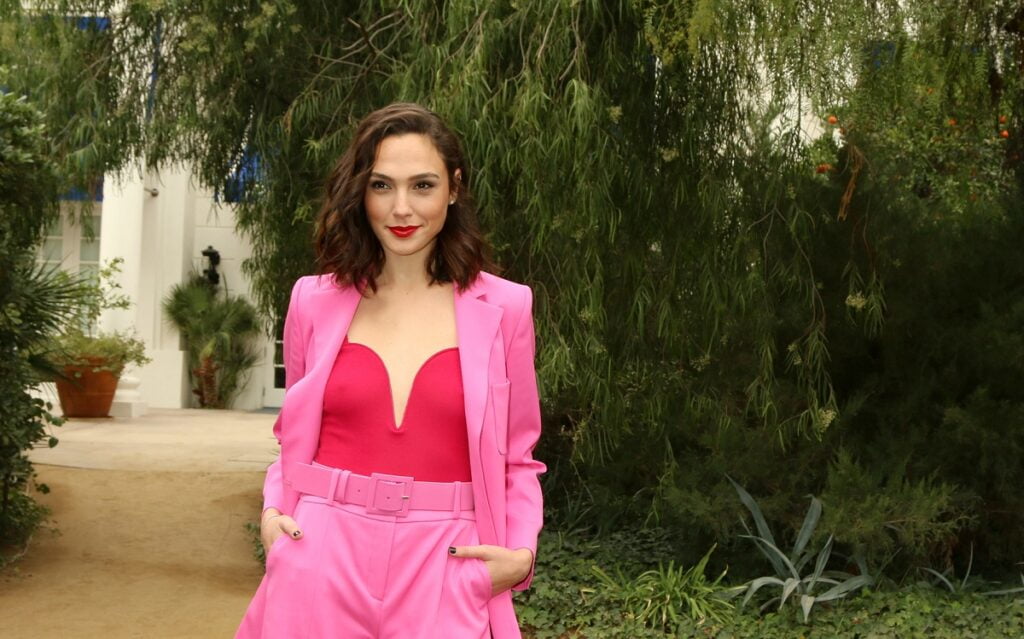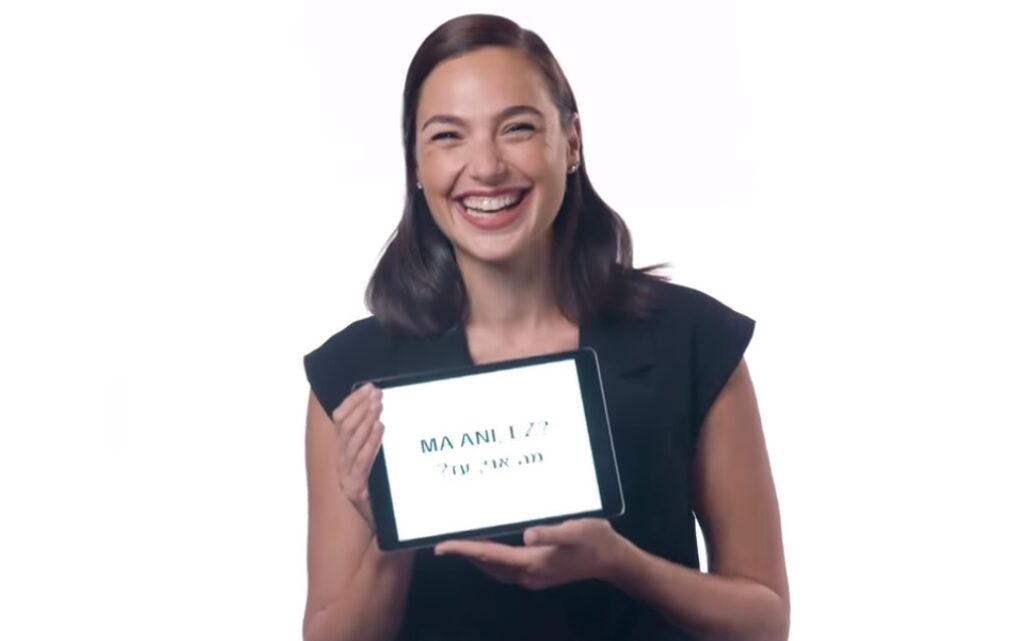Israel’s favorite actress and celebrity Gal Gadot schooled viewers on some recognizable – and some questionable – Hebrew slang this week in a new video that had her break into fits of laughter trying to explain some of the terms in English.
How does one really explain “Ma ani, ez?” (“what am I, a goat?”) or “shtuyot be mitz” (“nonsense in juice”) to non-Hebrew speakers? But Gadot nails the expressions, of course, complete with the relevant body language, hand movements, and facial expressions.
SEE ALSO: Gal Gadot, Steven Spielberg, Sacha Baron Cohen On Shortlist For 2021 Genesis Prize
The famous Israeli actress of “Wonder Woman” fame appeared on Vanity Fair’s latest episode of Slang School, where celebrities hilariously break down slang terms from their native countries or regions or instruct viewers on various popular expressions related to a subculture. The series is wildly popular – 82 episodes and counting – and features actors and figures such as Charlize Theron with South African slang, Salma Hayek with Mexican slang, Idris Elba with British slang, and RuPaul with drag slang (among many others.)
In her episode, Gadot patiently explains that “ma ani, ez?” is not actually related to any farm animals but means something like “what am I, stupid?” And that another farm animal term, “para para” (cow, cow), means to take things slowly or one step at a time. Like tackling one cow at a time, it seems. Or perhaps moving slowly like a cow.
Other terms make perfect sense. The Hebrew term “esh” (also, literally, fire) means the same thing that it does in English: It is used to express excitement about something or someone.
Gadot also revealed a superstitious streak, divulging that she uses the term “bli ayin hara” (“without the evil eye”) quite often, accompanied by “tfu, tfu, tfu,” a sort of low-key spitting without the spit (an act similar to knocking on wood) and “hamsa, hamsa” to ward off said evil eye.

“Achi,” or “brother” (also bro or dude) would be recognizable to anyone who lives or visits Israel often or is part of an Israeli community abroad. As would “tachles” (loosely translated as “bottom line”), “yalla,” a versatile term in Arabic commonly used in Hebrew to mean any number of things depending on context (it could mean let’s go, or move it, or hurry up, or enough).
Then there are the food-related terms like “shtuyot be mitz” which Gadot describes as “crap in juice” or “BS,” and “rosh kruv” or “cabbage head” to mean someone who is not very bright. But she notes that the latter is a rather old slang term and not used anymore.
As a bonus term, Gadot takes it upon herself to explain “afa alaich/alecha,” literally “flying on you,” which she says she uses often to express love and appreciation.
“Ani afa alechem, Vanity Fair,” she signs off with a kiss.
Earlier this year, Gadot featured in a Vogue video, answering 73 questions for viewers such as what is her morning routine, how often she gets to Israel and what she misses most about her native country, before teaching her interviewer some Hebrew terms such as “sababa” and “yalla.”
Sign up for our free weekly newsletter
SubscribeFrom Wonder Woman to Cleopatra
Gadot has been famous in Israel for the better part of two decades but she catapulted to international fame after portraying Wonder Woman in the solo film of the same name in 2017, as well as Batman v Superman: Dawn of Justice and Justice League.
Wonder Woman, directed by Patty Jenkins, alone grossed more than $800 million at the box office worldwide, making it the 5th highest-grossing US superhero movie of all time.

Gadot became one of Hollywood’s top actors, earning a spot on TIME magazine’s annual list of the 100 most influential people in the world and was recently listed by Forbes as the third highest-paid actress in the world in 2020.
Forbes reported that Gadot earned over $30 million this year, including $20 million from Netflix for her role in Red Notice, an upcoming international crime thriller set for release in 2021 where she portrays the world’s greatest art thief.
Her Wonder Woman sequel, Wonder Woman 1984, for which she reportedly earned $10 million, was set for release earlier this year but has been on ice due to the global pandemic. The film is expected to drop on December 25, 2020 – Christman Day – in US theaters.
This week, Gadot stirred some controversy on social media when it was announced that she would team up with Jenkins once again for a period biographical drama where she would portray famous Egyptian monarch Cleopatra, the last ruler of the Ptolemaic Kingdom of Egypt and a descendant of Ptolemy I Soter, a Macedonian Greek general.
“Cleopatra is a story I wanted to tell for a very long time.Can’t be more grateful about this A team!!” Gadot tweeted
Some observers and social media users felt Cleopatra should be portrayed by an Arab or African actress.
The film, Deadline reported, was Gadot’s idea together with her husband Jaron Varsano with whom she runs their production company Pilot Wave. The company is developing an eight-episode series about the life of American actress and inventor Hedy Lamarr that will air on Apple TV+, and another show, a WWII thriller, about Irena Sendler, a social worker and nurse who saved over 2,500 children in Nazi-occupied Poland by helping to smuggle them out of the Warsaw Ghetto. Gadot will play the lead role in both series.
Gadot’s company is also co-producing a movie based on the book “All The Rivers” by Israeli author Dorit Rabinyan (published in Israel as “Borderlife”), a book that was banned in Israeli high schools. The acclaimed, award-winning book tells the story of an Israeli woman, Liat, and a Palestinian man, Hilmi, who meet in New York and fall into a sweeping, complicated love affair.
Gadot was shortlisted for the 2021 Genesis Prize, also known as the “Jewish Nobel.”
Related posts

Rehabilitation Nation: Israeli Innovation On Road To Healing

Israeli High-Tech Sector 'Still Good' Despite Year Of War





Facebook comments